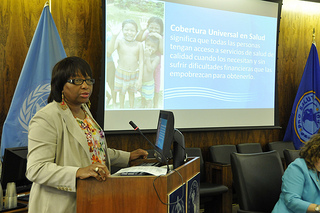

Health experts met this week at the Pan American Health Organization/World Health Organization (PAHO/WHO) to take stock of regional advances in the mobilization of universal health coverage, including efforts to expand access to health care with financial protection.
Washington, D.C., 13 September 2013 (PAHO/WHO) — Health experts met this week at the Pan American Health Organization/World Health Organization (PAHO/WHO) to take stock of regional advances in the mobilization of universal health coverage, including efforts to expand access to health care with financial protection.
 "Universal health coverage means that all
persons have access to comprehensive, high-quality, and people-centered care,
with financial protection as well as participation in decision-making and
access to the social determinants of health," said PAHO Director
Carissa F. Etienne. "This is a journey, and our member states are at different
stages in its progressive realization. Each country has the responsibility to
set its course and milestones while advancing ever closer to universal coverage."
"Universal health coverage means that all
persons have access to comprehensive, high-quality, and people-centered care,
with financial protection as well as participation in decision-making and
access to the social determinants of health," said PAHO Director
Carissa F. Etienne. "This is a journey, and our member states are at different
stages in its progressive realization. Each country has the responsibility to
set its course and milestones while advancing ever closer to universal coverage."
The PAHO Strategic Consultative Meeting on Achieving Universal Health Coverage in the Americas, held on 12-13 September, brought together experts from academia, nongovernmental organizations, foundations, and international development institutions to discuss progress and challenges in the achievement of universal health coverage in the Americas.
Participants noted that countries in the Americas are at different stages of implementing universal health coverage. Many have made political commitments to advance toward the goal, but all face challenges in achieving it. Chief challenges include ensuring sufficient and sustainable financing, improving the quality and efficiency of health systems, and guaranteeing comprehensive, integrated health care that includes prevention and health promotion and is available to all.
Participants said that primary health care—based strategies bring together all those elements and for that reason represent the best path toward universal health coverage.
"Linking universal health coverage to primary health care is indispensable to strengthening health systems," said Soledad Barría, former minister of health of Chile. "There is no chance of achieving to universal health coverage without developing health systems based on primary health care."
Participants said that advancing universal health coverage in the region would require advocacy and technical cooperation by PAHO and its member countries in areas including:
- Establishing a baseline for the achievement of universal health coverage in different countries and measuring and monitoring progress in expanding health coverage at the population level.
- Strengthening norms, regulations, and legal frameworks for universal health coverage using a human rights approach.
- Identifying and addressing obstacles to access to health services for vulnerable groups.
- Identifying and costing packages of essential health services for countries at different stages of progress toward universal health coverage.
- Building social and political consensus for the goal of universal health coverage.
- Gauging public expectations about health care coverage and quality to ensure a "people-centered" approach.
- Addressing the social determinants of health as an essential part of efforts to advance universal health coverage.
The Consultative Meeting on Achieving Universal Health Coverage in the Americas was organized by PAHO/WHO with collaboration of the Harvard Global Equity Initiative, and with support from the Rockefeller Foundation.

Links



